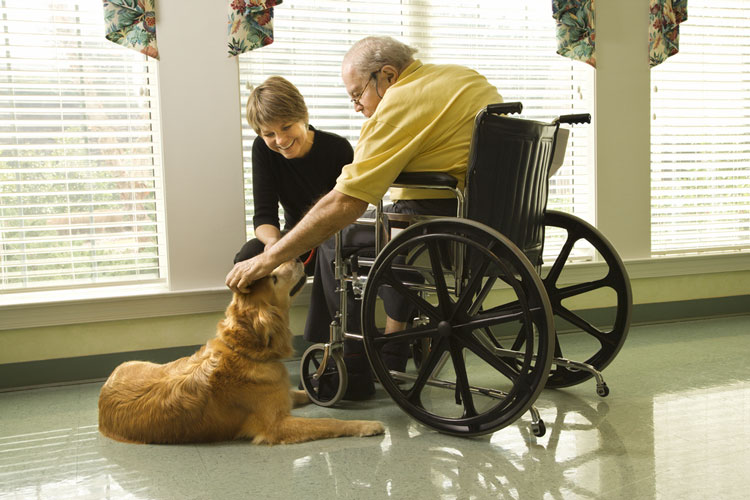Transitioning into assisted living or a nursing home can be a difficult change to make for many people. Leaving the familiarity of home can cause tremendous fear and anxiety. Also, not being able to take pets can make the transition even more difficult.
Therapy dogs have been shown to reduce patient stress and anxiety in assisted living situations and make individuals calmer and more cooperative. However, are emotional support animals and service animals allowed to accompany residents in assisted living situations? Here are the official guidelines.
Emotional Support Animals in Nursing Homes
Emotional support animals provide comfort by their presence and are protected by the Fair Housing Act. Certified emotional support animals have the freedom to live anywhere regardless of pet policies. However, emotional support animals are not allowed to accompany their owners in public at all times the way that service animals are. This means that assisted living and nursing home facilities do not have to allow emotional support animals.
However, facilities are more likely to allow them because they house people who are higher functioning and able, for the most part, to care for themselves and a pet. Nursing homes or facilities designed to care for older adults full-time are less likely to allow emotional support animals, especially since the individuals will likely not be able to care for the animal.
Service Animals in Nursing Homes
Service animals are almost exclusively dogs who are trained to perform a specific task related to an individual’s disability, whether mental or physical. Service dogs are considered necessary medical equipment and may accompany their owners wherever they go. This includes hospitals, assisted living, and nursing homes.
Alternative Programs
Many nursing homes or assisted living facilities have visiting therapy dogs or programs involving animal interaction, and some allow pets to be brought in by other family members to visit. This is due to the strong research supporting how animals can reduce patient suffering and encourage mental and physical healing.
The Care of the Animal
However, even if a nursing home or assisted living facility allows residents to have emotional support animals or service animals, the care of the animal must be taken into consideration. The staff cannot be held responsible for its care, and the individual may not be physically or mentally able to attend to the animal’s needs. This is why having family bring in the animal for a visit is a common solution.
In conclusion, emotional support animals are not permitted into assisted living or nursing home settings unless the facilities’ policies specifically allow for it. Service animals are allowed if handlers are in these settings; however, the care of the service animal must be the owner’s responsibility. Many of these facilities allow pets to visit and frequently bring in therapy dogs to visit residents. Always contact the facility you plan on moving to and see their policies regarding your specific situation.
You will need an emotional support animal or service animal letter of certification to bring your emotional support animal or service animal as a companion. You can easily get one at United Support Animal, where our friendly staff is ready to assist you. Call today at 800-918-3151




